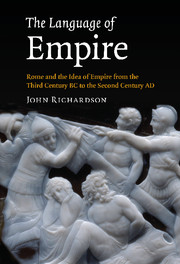 The Language of Empire
The Language of Empire Book contents
- Frontmatter
- Contents
- Preface
- List of abbreviations
- 1 Ideas of empire
- 2 The beginnings: Hannibal to Sulla
- 3 Cicero's empire: imperium populi Romani
- 4 The Augustan empire: imperium Romanum
- 5 After Augustus
- 6 Conclusion: imperial presuppositions and patterns of empire
- Appendix 1 Cicero analysis
- Appendix 2 Livy
- Appendix 3 Imperium and provincia in legal writers
- Bibliography
- Index
Appendix 3 - Imperium and provincia in legal writers
Published online by Cambridge University Press: 01 October 2009
- Frontmatter
- Contents
- Preface
- List of abbreviations
- 1 Ideas of empire
- 2 The beginnings: Hannibal to Sulla
- 3 Cicero's empire: imperium populi Romani
- 4 The Augustan empire: imperium Romanum
- 5 After Augustus
- 6 Conclusion: imperial presuppositions and patterns of empire
- Appendix 1 Cicero analysis
- Appendix 2 Livy
- Appendix 3 Imperium and provincia in legal writers
- Bibliography
- Index
Summary
There is one rich source of uses of the words imperium and provincia which has been used only in passing in the main sections of this book, and that is the legal sources. The authors, whose writings were excerpted on the orders of the emperor Justinian in the sixth century AD and gathered together into the Digest in the process of producing a manageable account of the law, are of undoubted value in any attempt to understand the workings of the structures of the Roman world and of the mentalities which underlay it. There are, however, three particular problems in the use of the Digest when trying to discover patterns of word-usage from the late third century BC through to the mid second century AD. The most obvious difficulty is that the majority of the citations in the Digest are from writers from the late second and early third centuries AD, such as Ulpian, Paul and Papinian, who are, properly speaking, outside the limits of the already somewhat lengthy period covered by this book. Secondly the citations in the Digest are short and thus sometimes lack context. Perhaps more important, however, is the uncertainty as to the content of the citations, since the collection was edited and interpolated by the compilers on the instructions of the emperor, in order to make the sense clear and bring the material up to date. The extent of these interpolations has been a matter of dispute among scholars for over a century, but there is no doubt that there has been some considerable editorial work. The uncertainty that this creates adds to the problems always present in determining exactly what an ancient author wrote and requires extra care when tracing the usage of particular words.
- Type
- Chapter
- Information
- The Language of EmpireRome and the Idea of Empire from the Third Century BC to the Second Century AD, pp. 206 - 210Publisher: Cambridge University PressPrint publication year: 2008


